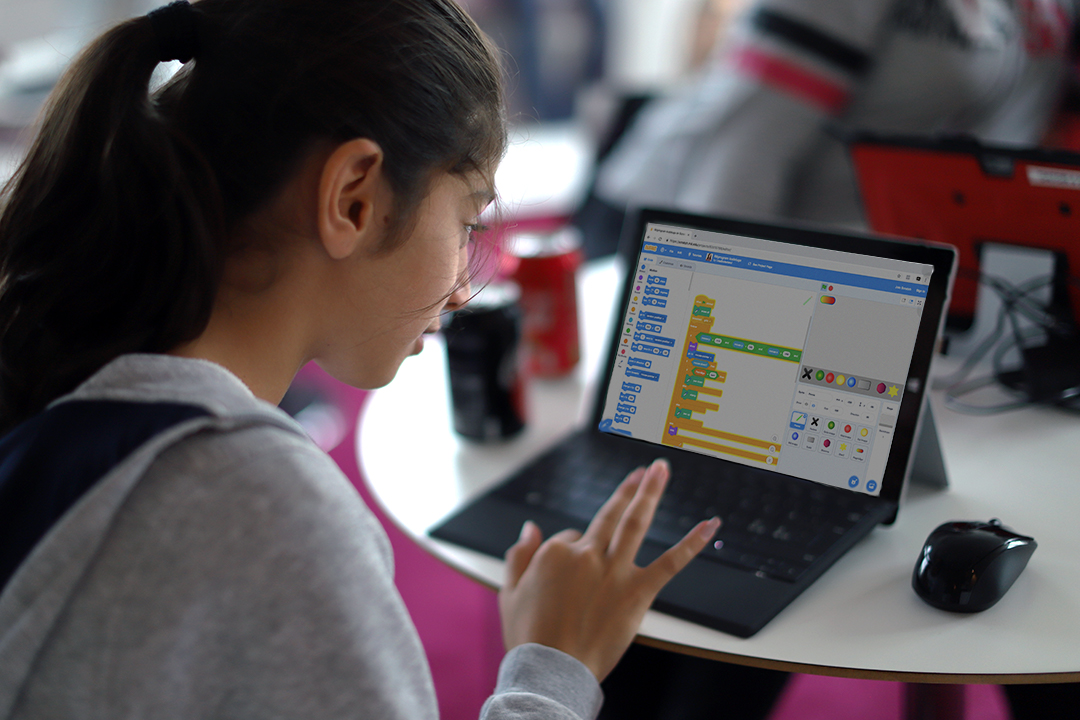Supporting students and educators in Sweden with technology during COVID-19 shutdowns

Kodcentrum , a Swedish non-profit that introduces youth in Sweden to computer science , programming, and digital skills free of charge, had a full 2020 planned, with in-person coding clubs, hackathons, and other activities on the schedule. However, when COVID-19 hit, the organization had to quickly assess how to change their delivery methods to offer programs in a safe, distant way.

Kickstarting online education and virtual hackathons
In light of the COVID-19 outbreak, Microsoft contributed funding to Kodcentrum. The contribution is being used to support middle-school teachers and educators in Staffanstorp (10 schools), Gävle (25 schools), and Sandviken (14 schools) with online training and webinars to provide help and inspiration around starting digital lessons that align with national curriculum. The donation also supports online hackathons and outfits volunteers with the necessary tools to guide students through coding projects. Kodcentrum has been agile in shifting its offerings and has expanded programming to fully support educators and students alike, focusing on making sure that everyone is up to speed with new digital learning requirements. The situation emphasized to schools and teachers that they need to work to improve digital skills and become accustomed to teaching in different ways.
Prototyping new programming during a pandemic
As an organization that focuses on digital programming and creation, Kodcentrum saw a natural opportunity for them to shift programming online when in-person meetings were cancelled. The Kodcentrum team split up into two groups to brainstorm new ways to deliver activities to students and to support educators. Committed to refining program offerings based on new learnings over time, Kodcentrum was able to move quickly and had new offerings established within a week. Digitalization allowed Kodcentrum to reach new target groups and offer more accessible services.
First, the organization created a landing page with tips and tricks for teachers and links to additional resources, to act as a hub for teachers who had to switch to virtual learning with little or no notice. An additional resource is a chat function that’s available for students, teachers, and classes to use when they’re stuck on a task or need tips.
Teachers have also been invited to two 30-minute webinars per week with local educators, volunteers, and other guests; each session is followed by a 15-minute question-and-answer session. These sessions have explained Kodcentrum’s offerings and cover themes like coding, algorithms, space, digital storytelling, and games.
Weekly online hackathons have been held, with a 30 minute session to kick off the event and present the assignment, followed by two hours of working time where students program in Scratch, while volunteers, who are professional programmers, are available to help via chat. Students get to know what programming is, what it is used for, and why it’s important to learn. At the end, the resulting projects are presented and participants discuss any tricky tasks they encountered.
Looking ahead to new offerings and increased partnership opportunities
Microsoft was able to facilitate introductions for Kodcentrum, allowing them to kick off conversations with the business contacts at local municipalities, who in turn connected Kodcentrum with the head of schooling within each municipality. Kodcentrum was thus able to engage with the people who are responsible for supporting and encouraging teachers to include programming skills and digital tools in each school. Through these introductions, Kodcentrum was able to convey the importance of new digital learning platforms and really gain buy-in for their work. Once these contacts were established, the coordinators in Sandviken and Gävle suggested that it would be great to work across the municipalities and bring the students and teachers together.
In Staffanstorp, it was essential for Kodcentrum to talk to the head of schools first; they had not previously focused on digital skills and their coordinator was incredibly happy to have the group help her advocate for new programming and digital resources. She is now using this project as a steppingstone to get teachers to offer more programming and digital creation in the municipality. The connections in all three communities were accelerated by Microsoft and this partnership stands only to strengthen.
Kodcentrum is already challenging itself to plan for more new initiatives and forms of delivery with an acceptance of failing fast. In the fall, Kodcentrum will start offering digital coding clubs. The club will be comprised of a larger open hackathon made up of smaller groups where the children get to know the volunteers and work more in-depth on different assignments. “Microsoft is proud to collaborate with Kodcentrum in the work of introducing and inspiring teachers and students to programming and digital creation. Initiatives of this kind are an important part of our work with the local community to, among other things, create new opportunities for individuals and companies,” says Therese Treutiger, vice president at Microsoft Sweden.

